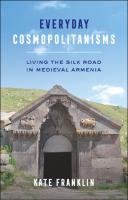Everyday Cosmopolitanisms
Living the Silk Road in Medieval Armenia (Edition 1)
Author(s)
Franklin, Kate
Collection
Knowledge Unlatched (KU)Language
EnglishAbstract
A free open access ebook is available upon publication. Learn more at www.luminosoa.org.Widely studied and hotly debated, the Silk Road is often viewed as a precursor to contemporary globalization, the merchants who traversed it as early agents of cultural exchange. Missing are the lives of the ordinary people who inhabited the route and contributed as much to its development as their itinerant counterparts. In this book, Kate Franklin takes the highlands of medieval Armenia as a compelling case study for examining how early globalization and everyday life intertwined along the Silk Road. She argues that Armenia—and the Silk Road itself—consisted of the overlapping worlds created by a diverse assortment of people: not only long-distance travelers but also the local rulers and subjects who lived in Armenia’s mountain valleys and along its highways. Franklin guides the reader through increasingly intimate scales of global exchange to highlight the cosmopolitan dimensions of daily life, as she vividly reconstructs how people living in and passing through the medieval Caucasus understood the world and their place within it. With its innovative focus on the far-reaching implications of local practices, Everyday Cosmopolitanisms brings the study of medieval Eurasia into relation with contemporary investigations of cosmopolitanism and globalization, challenging persistent divisions between modern and medieval, global and quotidian.
Keywords
History; World; History; Europe; Medieval; History; Asia; Central AsiaDOI
https://doi.org/10.1525/luminos.109ISBN
9780520380936Publisher
University of California PressPublisher website
https://www.ucpress.edu/Publication date and place
2021Grantor
Imprint
University of California PressClassification
General and world history
European history
Asian history


 Download
Download